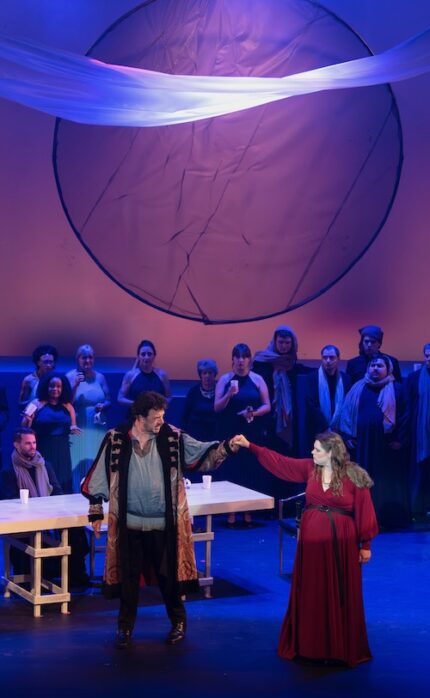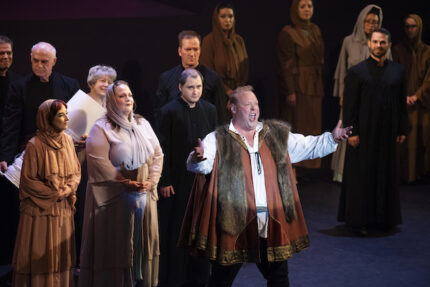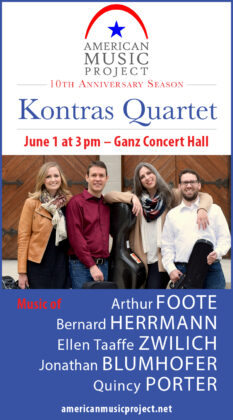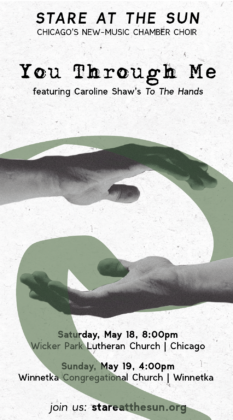Opera Festival of Chicago serves up an arresting “Attila”

The Opera Festival of Chicago’s advertisements for their production of Verdi’s Attila call it “one of his most popular earlier works.” But in reality, their production—which premiered Thursday night at Cahn Auditorium in Evanston—is one of the rare opportunities to see this opera, which most houses perform (at most) once every couple of decades.
During his conquest of Rome, Attila spares prisoner of war Odabella (whose father he killed), and grants his sword to her out of recognition for her bravery. Two Romans—Odabella’s former lover Foresto and the general Ezio—plot to kill Attila. Odabella foils their assassination plot, earning her place as Attila’s wife. But she has spared Attila only so that she can kill him herself, with his own sword.
Like much early Verdi, most of Attila sounds like low-sugar, high-protein Donizetti—although less lyrically alluring and more aggressive. There are, however, glimmers of the originality that would set Verdi apart from his predecessors: His vivid depiction of the storm in the Prologue presages similarly rich meteorological music in Rigoletto and Otello. Odabella’s Romanza “Oh! Nel fuggente nuvolo” opens with her accompanied only by a solo English horn—a striking instrumental choice.
Andrea Silvestrelli’s brawny bass timbre made him a perfect fit for the barbarous title character. Granted, his high Fs in Attila’s Act 1 cabaletta, “Oltre quel limite, t’attendo, o spettro” were not causes for joy. But any music in the role’s middle and low ranges was suitably commanding. And although the role grants the singer minimal emotional range, Silvestrelli seized on one of his few opportunities to act, and he convincingly portrayed Attila’s terror at his nightmare in “Mentre gonfiarsi l’anima parea.”
Soprano Jenny Schuler played Odabella, the only role with any psychological depth, which she effectively communicated. Her timbre was steely in Odabella’s defiant moments and tender or fearful when needed, such as when remembering her father. The soprano’s wide vibrato meant that some of her faster music in the Prologue was smudged. But her dynamic and emotional range in her Act 1 solo arias and her subsequent duets with Foresto more than made up for this.

Ben Gulley’s turn as Foresto was the standout performance of the evening. Foresto, like most early Verdi tenor roles, is a one-dimensional meathead. But you wouldn’t know that from Gulley’s interpretation. His phrasing and tonal shading took advantage of any word that afforded nuance.
Baritone Franco Pomponi, who played Ezio, has an appealingly focused tone. But his interpretation was too one-note with a limited array of stage gestures. He had a habit of resorting to crescendoing on ascending phrases whenever possible.
The staging by director George Cederquest was mostly typical “stand in the center and sing” fare, although the spatial arrangement of the banquet scene (with diners on stage right, and stage left reserved for dancing and plotting) was effective. But why, exactly, were the Roman refugees carrying plastic buckets in the Prologue? When they formed the buckets into a holy cross, a woman in the audience snickered at what should not be a comic moment.
The spartan set (just a wall, some stairs, and a hoop that played the moon and sun) meant that Mike Goebel’s lighting design, bathing each scene in a different color, did a lot of the work in setting the mood. Most of his choices worked well, with one exception. iIn the Act 2 banquet as the chorus sings “Vedi adunarsi i nembi / Di sangue tinti” (“See the clouds gather / dyed blood-red”), the stage lighting was a bright purple.
Costumes by Emily Daugherty were a puzzling chronological and geographical hodgepodge. Attila was dressed like he’s from the Italian Renaissance. Ezio had a Roman breastplate, as expected, but a glittery gold cape out of a Vegas magic act. The women’s outfits were also plausibly Roman. But Attila’s soldiers wore black monastic robes and Middle Eastern-style headscarves.
The surtitles proved the greatest lapse of the production, often poorly coordinated with the singing, with lines appearing onscreen too early, too late, or for too short a time. For most arias, translations were projected for only a quarter or half of the text, as if to say, “you get the gist.” This does a disservice to the singers, as the non-Italian-speaking members of the audience cannot appreciate moments when the performers intelligently tailor their phrasing to the untranslated text.
Emanuele Andrizzi’s conducting was perfectly idiomatic. The score requires high energy to thrive, and Andrizzi generated this without resorting to rushed tempi or ragged playing. And he highlighted the occasional moments of pathos or creative scoring that Verdi provides.
Attila will be repeated at Cahn Auditorium 3 p.m. Sunday. operafestivalchicago.org
Posted in Performances




Posted Jul 22, 2023 at 7:35 am by Don Dugal
A generous (for soprano and staging) and fair review of the evening’s presentation.
Notice of the contribution of Ben Gulley is certainly warranted. He sang with a passion and nuance that I doubt could be equaled anywhere on Earth at this moment. What a superb voice and method to flesh out every musical bit of what Verdi wrote.
‘Star tenors’ are in very short supply. Ben should be on every major opera stage.